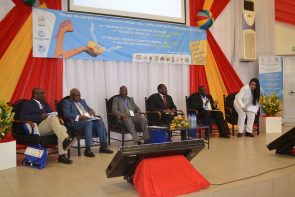ACE stakeholders convene to discuss Progress and way forward for the Project


PRESS RELEASE: Ouagadougou Celebrates Academic Excellence in Africa
22 Centers of Excellence presented their education and applied research programs and innovations to the public
Ouagadougou, 7 May 2018. The very first “Higher Education Student Fair” of the African Centers of Excellence (ACEs) was held today on the campus of the Institute of Water and Environmental Engineering (2iE) in Ouagadougou, Burkina Faso. All the 22 ACEs financed by the World Bank and hosted by universities in 9 West and Central African countries (Benin, Burkina Faso, Cameroon, Côte d’Ivoire, Gambia, Ghana, Nigeria, Senegal and Togo) attended the event.
“This is a great day for Africa, as well as all the ACEs represented here to celebrate academic excellence. The training and research programs presented to the public today demonstrates that we are capable of developing the advanced skills Africa needs to accelerate its development“, said Professor Etienne Ehilé, Secretary General of the Association of African Universities (AAU), the institution responsible for monitoring the implementation of the ACEs and co-organizer of the event.
The research programs presented cover the following areas: (i) genomics and infectious diseases; (ii) water, energy and environment; (iii) agricultural development and environmental sustainability; (iv) cell biology of infectious pathogens; (v) neglected tropical diseases and forensic biotechnology; (vi) crop improvement; (vii) phytomedicine and development; (viii) reproductive health and innovation; (ix) mathematical sciences and applications; (x) oilfield chemicals; (xi) water and sanitation; (xii) poultry sciences; (xiii) information and communications technology; (xiv) maternal and child health; (xv) dryland agriculture; (xvi) food technology; (xvii) statistics; (xviii) climate change; (xix) mining; and (xx) materials science and engineering.
Each of the 22 ACEs is regionally unique. They aim to support the emergence of regional poles of excellence within higher education and applied research. The centers seek to produce a critical mass of high-level specialists at the Masters and PhD levels as well as providing short term professional training to professionals seeking to improve their skills. These programs are focused on producing the skills needed to address regional development challenges in areas such as water, agriculture, health, technology, engineering and mathematics.
“Our programs meet the international standards and our students come from all over Africa. At the end of their training, they are competitive, innovative and immediately access the job market, thus reflecting our slogan of “One diploma, one job”, said Professor Harouna Karambiri, hydro-climatologist and Coordinator of CEA-2iE.
In opening the Fair, Mr. Cheick Fantamady Kanté, World Bank Country Manager for Burkina Faso highlighted the innovative aspect of the ACEs: “The African Centers of Excellence project that we support is one of the most innovative projects aimed at providing Africa with the technical know-how necessary to meet its many development challenges”.
“I am happy to be here and expect to interact with students and other visitors on the key achievements of our center. Our team is happy to present to the public our high-ranking Master’s and PhD programs which are contemporary, comprehensive and up to date on reproductive health”, said Dr. Mrs. O.E. Obarisiagbon, PhD student at the Center of Excellence on Reproductive Health Innovation, at University of Benin, Nigeria.
Several actors of the academia (including students), the private sector, industry, civil society, and others visited the Fair to discover the research areas covered by the ACEs and to explore opportunities for effective partnerships: “I heard about the centers of excellence and came to find out what programs are available to help me make the best choice for my Master’s studies,” says Hassane Koumare, a third-year undergraduate physics student from Mali who visited the Fair.
For Mr. Andreas Blom, Lead Economist and Task Team Leader for the ACE project at the World Bank, the ACEs are achieving good results and are being successful in attracting more students from the region. He commends its ownership by all stakeholders and indicates the next steps: “Currently, the ACEs have developed more than 15 programs that are accredited and meet international standards. In addition, the ACEs have developed 35 new programs that have already attracted about 6,000 students in Master’s and 1,600 PhD students; of these, 3,000 are regional students”. We are encouraged by the strong ownership of the ACEs at institutional, national and regional levels and we are taking steps to move to the next level to support the creation of new centers of excellence and provide additional financing to scale up on some of the existing ones that are already glowing at regional and international level”.
The African Centers of Excellence initiative is a flagship program supported by the World Bank that is providing an innovative regional response to make higher education more relevant to Africa’s development. With a total investment of $165 million, the project offers an optimal way to build regional specialization, concentrate limited top-level faculty, generate spillovers and meet private sector demand for technical skills.
You can download the following:
CONTACTS
For more information, please contact: